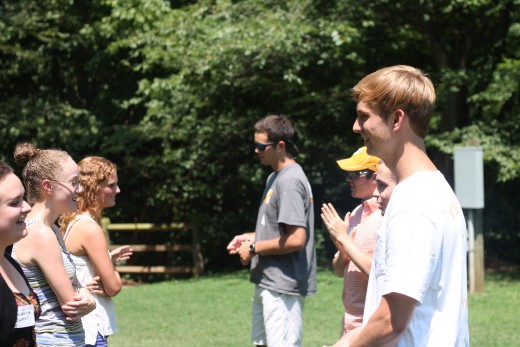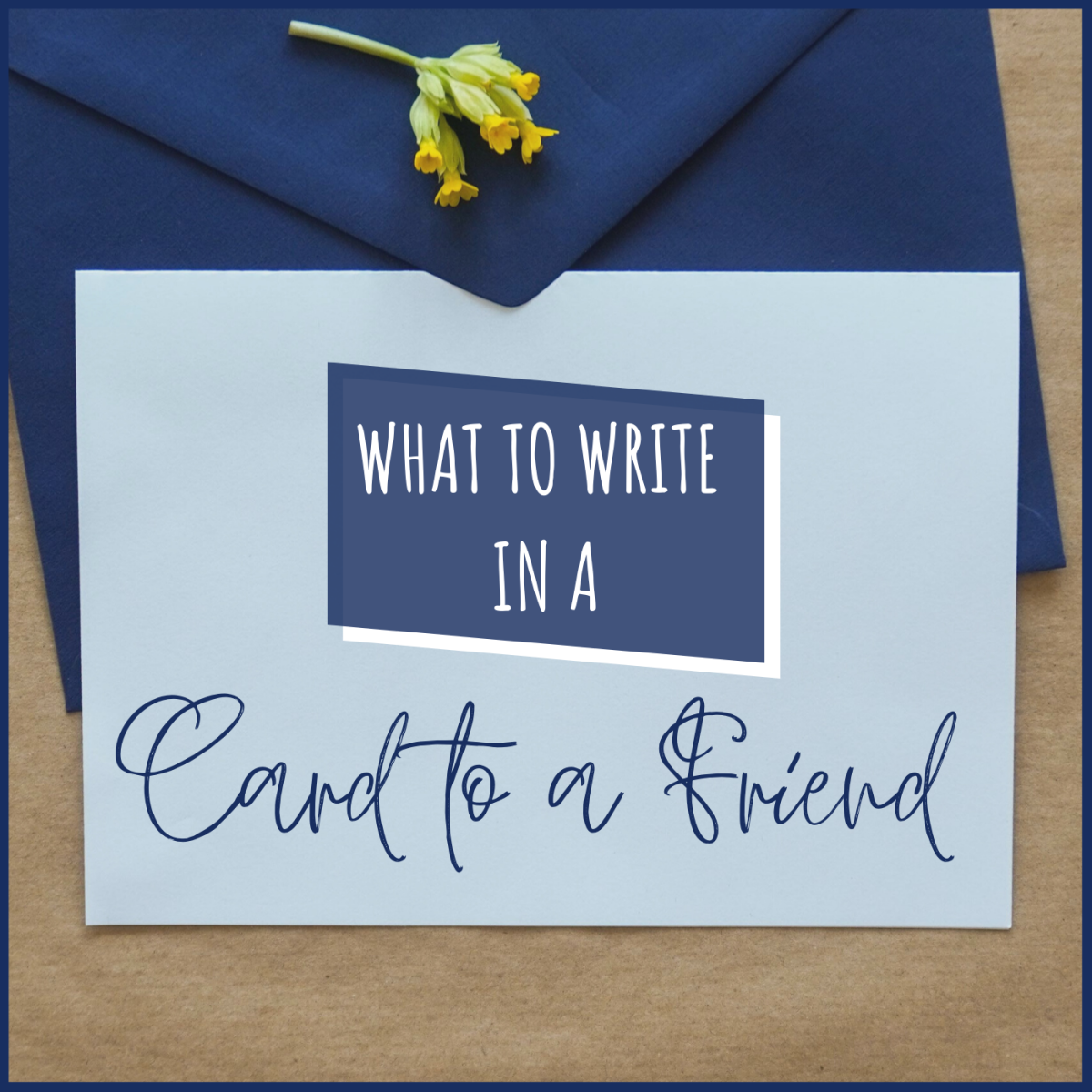How to Make Friends in Your 20s
Quick Version
- Set a reasonable goal.
- Go places.
- Talk to strangers.
- Make plans.
- Make more plans.
- Repeat 1 to 5.
- Have friends and be happy.
How to Make Friends in Your 20s
Friendships and acquaintances in high school and college seem to come easily for many people. They come and go, but there seems to be a semi-constant flow of people wanting to spend time with you doing mundane things like driving to Krispy Kreme at 2:00 a.m. or watching reruns of Gilmore Girls for eight hours straight. If you've always had a hard time making new friends, then you might be at an advantage now. You have reasonable expectations and know that it's not easy.
When you're out of school, it doesn't seem so easy. Jobs, family, bills, and location are obstacles that might not have existed or were easier to work around when you're in school. Everyone your age is facing similar obstacles.
Making friends in your 20s doesn't have to feel like a chore. It can feel a lot more effortful than making friends as a child or young adult. It takes practice. It feels awkward, especially at the start. If you do it enough, at some point it becomes habitual. You start to interact purposefully. You get better at making friends. It also takes patience. It comes down to a numbers game. Not every person you meet will become your friend and not all of your friends will stick around.
My grandmother always told me that if you can count your friends on one hand, you should consider yourself lucky. What I took from that is that it's probably more important to have a smaller number of good friends than many acquaintances. It's not realistic to have 50 friends.
Set a new friend goal or even a goal to reconnect with an old friend. An example is that you will make two new friends in the city that you live in three months. That's all you have to do to get started is to set a goal. Well, and leave your house. And start conversations with strangers.
Remember: Life Is Not Like Saved by the Bell
![Roulette By © Ralf Roletschek - Fahrradtechnik und Fotografie (Own work) [GFDL (http://www.gnu.org/copyleft/fdl.html) or CC-BY-SA-3.0-2.5-2.0-1.0 (http://creativecommons.org/licenses/by-sa/3.0)], via Wikimedia Commons Roulette By © Ralf Roletschek - Fahrradtechnik und Fotografie (Own work) [GFDL (http://www.gnu.org/copyleft/fdl.html) or CC-BY-SA-3.0-2.5-2.0-1.0 (http://creativecommons.org/licenses/by-sa/3.0)], via Wikimedia Commons](https://usercontent1.hubstatic.com/9171800_f520.jpg)
It's a Numbers Game
I have a friend who works for a large online dating website and she told me, "It's a numbers game. I've been on hundreds of dates and one boyfriend came out of it." While those numbers seem a bit bleak, it makes sense. She said, "It's like anything else, like meeting people out at bars. Think about how many people you've met at bars or church and how many boyfriends came out of that." Good point.
This can be applied to friendships as well. You went to school with a lot of people. Not all of them were your friends. You can't expect to become best friends with the first five people you meet, be in each other's weddings, have girls' nights every week until you're 30 and start having babies. You have to meet a lot of people to make friends.
So, how do you do this?
Step 1. Leave your house.
Step 2. Go a variety of places at different times. Grocery stores, bars, restaurants, gyms, fitness classes, libraries, and coffee shops. Or anywhere that you like to go where there will be other people.
Step 3. Go to some places at the same time every week (e.g., spinning class). If you see a few people regularly, you are eventually more comfortable talking to them. A regular habit also creates chances for an easy conversation starters (e.g., "What did you think of the sub today in spinning class?")
Step 4. Talk to people. It's really hard (see below for advice).
That's it. The more people you meet, the potential friends you meet. It's all about the numbers. Increase your chances by meeting people everywhere you go.

People Doing Ice Breakers

Say the Right Things. Or the Wrong Ones. Just Speak.
Knowing what to say to a stranger is hard. Think about the people that you like, that you want to be around, that you want to be your friend. Are they perfect? Do they have a perfect look and always say the right thing? Probably not. The people that are usually well-liked and fun to be around don't hide their imperfections. No one is perfect. Remember that and speaking to strangers will become easier.
Tell the truth." I'm new to town, I'm having a hard time meeting people, trying to make new friends." Not necessarily a great opening line, but don't be afraid to bring it up. Look for an opener (e.g., "I love your shirt.") and then see what happens. If you feel a connection, mention that you are interested in new friendships. A stranger might become a lifelong friend or someone you never see again.
Be sure to act. Make a plan for lunch. Get a phone number and use it. Don't just end the conversation with a noncommittal "I hope to see you later!" To make friends, make a habit of taking action. At the end of a dinner or book club, plan your next social event. It's not enough to connect with someone. Take initiative.
Before leaving an event, have at least one new event scheduled. When there are existing plans, people usually rescheduled rather than cancel. The best way to ask someone to do something is to be specific. For example say, "Are you free for lunch on Monday or Wednesday this week?" They will either say "Yes," or "Not this week, but what about next." Either answer results in plans with a potential friend.
Most people say, "Do you want to get lunch sometime?" The response is "Sure!" That is less likely to happen, even though it's essentially asking the same thing. Provide clear choices and you will more likely get a response that you want.
Reader Poll
Where do you like to meet people?
Diversify Your Friendship Portfolio
Don't seek out only one type of friend. Think about words that describe you. Are you single, married, or divorced? Do you have kids? What is your job? What are some things you like to do? Sometimes you find yourself being more comfortable with people you can describe the same way. It's a good place to start. It can be easy to make friends with people whom you share certain characteristics. But be careful about limiting yourself to one thing.
For example, if you meet several single people and you start becoming friends quickly. What happens when one or all of you get in a relationship? Some friendships don't overcome even the smallest obstacle, like a significant other. Some people decide they want to spend time with other couples. They might have less time to spend with you now that they also have a boyfriend. If you only have friends who live in your neighborhood, what happens if you move? Not all friendships last through major milestones (e.g., career changes, marriages, kids, divorces, and moves).
Diversify! Don't limit yourself to one type. Don't preemptively decide someone can't be your friend because they aren't married. Or if they don't have kids. Some people like to socialize with people like themselves. People that live in their neighborhood, other couples, other single people. You may have to accept that the person probably won't be your friend if you don't fit into that box.
Have Three Things to Talk About
Don't be a one-trick pony. To be a great conversationalist, be able to hold conversations about various things. Aim for having three to five things that you can carry a decent conversation about. People will get bored or annoyed with one subject (e.g., kids.) Expertise is not required.
Stick to simple things. It can be anything really from reality TV to college football. Learn a little about three to five subjects. Watch tv, read blogs, watch YouTube videos or read books. Only surface-level knowledge is necessary. This part is not hard. Remember, you don't have to know how to do something, just be able to talk about it.
Some Easy Subjects for Great Conversations
- Cooking.
- Popular TV Shows. Watch one or more popular television shows or read the recaps.
- Sports. Whatever sport is in season works best. Fake a lot by knowing very little (e.g., the names of the teams in the SEC conference).
- Craft Hobbies (e.g., sewing, knitting, crochet)
- Exercise and Fitness
- Beauty Products
- Shopping
- Clothes
- Celebrities
- Relationships
- Books
- Politics
- Current Events
- Kids
- Traveling
Apartment Building in TV's Hit Show "Friends"









